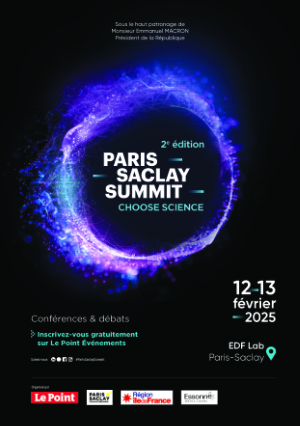L'IRRADIATION DES CELLULES IMMUNITAIRES : BÉNÉFIQUE OU NON POUR L'IMMUNITÉ NON SPÉCIFIQUE ? // IMMUNE CELL IRRADIATION: BENEFICIAL OR NOT FOR NON-SPECIFIC IMMUNITY?
|
ABG-127926
ADUM-59869 |
Thesis topic | |
| 2025-01-15 |
Université Paris-Saclay GS Chimie
ORSAY Cedex - France
L'IRRADIATION DES CELLULES IMMUNITAIRES : BÉNÉFIQUE OU NON POUR L'IMMUNITÉ NON SPÉCIFIQUE ? // IMMUNE CELL IRRADIATION: BENEFICIAL OR NOT FOR NON-SPECIFIC IMMUNITY?
NADPH oxydase, radiotherapie, radicaux libres, radiation ionisante, système immunitaire inné, radiolyse pulsée
NADPH oxidase, radiotharapy, free radicals, ionizing radiation, innate immune system, pulse radiolysis
NADPH oxidase, radiotharapy, free radicals, ionizing radiation, innate immune system, pulse radiolysis
Topic description
La radiothérapie est connue pour endommager le système immunitaire. Les neutrophiles, les globules blancs les plus nombreux et les premiers acteurs de l'immunité non spécifique, sont donc les premières cibles de la radiothérapie. Notre objectif est de comparer les effets de la radiothérapie conventionnelle et de la radiothérapie flash sur les neutrophiles. Nous avons déjà montré que l'irradiation conventionnelle stimule les neutrophiles, notamment en activant la NADPH oxydase, qui génère des espèces réactives de l'oxygène essentielles à la destruction des pathogènes. Nos travaux préliminaires sur l'irradiation flash indiquent que l'irradiation flash est plus protectrice que la méthode conventionnelle en ce qui concerne la mortalité des neutrophiles. De plus, les neutrophiles irradiés par flash conservent leur capacité à détruire les pathogènes. Nous émettons l'hypothèse que la technique d'irradiation flash comprend des techniques d'irradiation plus utiles pour le traitement du cancer que l'irradiation conventionnelle. La preuve de concept doit être validée plus précisément en irradiant des neutrophiles en suspension avec des doses et des débits de dose de l'ordre de ceux potentiellement utilisés en radiothérapie médicale flash et en comparant les changements induits avec ceux observés en radiothérapie conventionnelle.
------------------------------------------------------------------------------------------------------------------------------------------------------------------------
------------------------------------------------------------------------------------------------------------------------------------------------------------------------
Radiotherapy is known to damage the immune system. Neutrophils, the most numerous white blood cells and the first non-specific immunity actors are therefore radiotherapy's first targets. We aim to compare conventional and flash radiotherapy's effects on neutrophils. We have already shown that conventional irradiation stimulates neutrophils, particularly by activating NADPH oxidase, which generates reactive oxygen species essential in pathogen destruction. Our preliminary work on flash irradiation indicates that flash irradiation is more protective regarding neutrophil mortality than the conventional method. What's more, flash-irradiated neutrophils retain their ability to destroy pathogens. We hypothesize that the flash-irradiation technique consists of more valuable irradiation techniques for cancer treatment than conventional irradiation. The proof of concept needs to be more accurately validated by irradiating neutrophils in suspension with doses and rate-doses of the order of those potentially used in medical flash radiotherapy and comparing the changes induced with those observed in conventional radiotherapy.
------------------------------------------------------------------------------------------------------------------------------------------------------------------------
------------------------------------------------------------------------------------------------------------------------------------------------------------------------
Début de la thèse : 01/10/2025
------------------------------------------------------------------------------------------------------------------------------------------------------------------------
------------------------------------------------------------------------------------------------------------------------------------------------------------------------
Radiotherapy is known to damage the immune system. Neutrophils, the most numerous white blood cells and the first non-specific immunity actors are therefore radiotherapy's first targets. We aim to compare conventional and flash radiotherapy's effects on neutrophils. We have already shown that conventional irradiation stimulates neutrophils, particularly by activating NADPH oxidase, which generates reactive oxygen species essential in pathogen destruction. Our preliminary work on flash irradiation indicates that flash irradiation is more protective regarding neutrophil mortality than the conventional method. What's more, flash-irradiated neutrophils retain their ability to destroy pathogens. We hypothesize that the flash-irradiation technique consists of more valuable irradiation techniques for cancer treatment than conventional irradiation. The proof of concept needs to be more accurately validated by irradiating neutrophils in suspension with doses and rate-doses of the order of those potentially used in medical flash radiotherapy and comparing the changes induced with those observed in conventional radiotherapy.
------------------------------------------------------------------------------------------------------------------------------------------------------------------------
------------------------------------------------------------------------------------------------------------------------------------------------------------------------
Début de la thèse : 01/10/2025
Funding category
Funding further details
Programme COFUND LIGHTinPARIS
Presentation of host institution and host laboratory
Université Paris-Saclay GS Chimie
Institution awarding doctoral degree
Université Paris-Saclay GS Chimie
Graduate school
571 Sciences Chimiques : Molécules, Matériaux, Instrumentation et Biosystèmes
Candidate's profile
Le/la candidat/e doit avoir de bonnes compétences en biologie cellulaire et en biochimie des protéines. Des connaissances en radiobiologie et en (bio)chimie des rayonnements seront nécessaires.
The candidate should have good skills in cell biology and protein biochemistry. Knowledge of radiobiology and radiation (bio)chemistry will be required.
The candidate should have good skills in cell biology and protein biochemistry. Knowledge of radiobiology and radiation (bio)chemistry will be required.
2025-03-26
Apply
Close
Vous avez déjà un compte ?
Nouvel utilisateur ?
More information about ABG?
Get ABG’s monthly newsletters including news, job offers, grants & fellowships and a selection of relevant events…
Discover our members
 MabDesign
MabDesign  Nokia Bell Labs France
Nokia Bell Labs France  TotalEnergies
TotalEnergies  CASDEN
CASDEN  Généthon
Généthon  Tecknowmetrix
Tecknowmetrix  Aérocentre, Pôle d'excellence régional
Aérocentre, Pôle d'excellence régional  Institut Sup'biotech de Paris
Institut Sup'biotech de Paris  ADEME
ADEME  PhDOOC
PhDOOC  MabDesign
MabDesign  Laboratoire National de Métrologie et d'Essais - LNE
Laboratoire National de Métrologie et d'Essais - LNE  CESI
CESI  ONERA - The French Aerospace Lab
ONERA - The French Aerospace Lab  SUEZ
SUEZ  Groupe AFNOR - Association française de normalisation
Groupe AFNOR - Association française de normalisation  Institut de Radioprotection et de Sureté Nucléaire - IRSN - Siège
Institut de Radioprotection et de Sureté Nucléaire - IRSN - Siège  ANRT
ANRT  Ifremer
Ifremer
-
JobPermanentRef. ABG127615CESI- Ile-de-France - France

Enseignant chercheur sur la Gestion des systèmes de mobilités multimodaux
Computer scienceConfirmed -
JobPermanentRef. ABG127831WaveNRG- Provence-Alpes-Côte d'Azur - France

Energies marines renouvelables - jeune docteur(e) en mécanique des fluides
Physics - Energy - Engineering sciencesJunior





